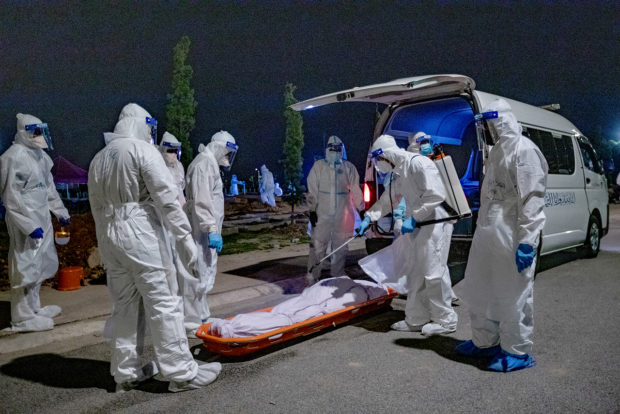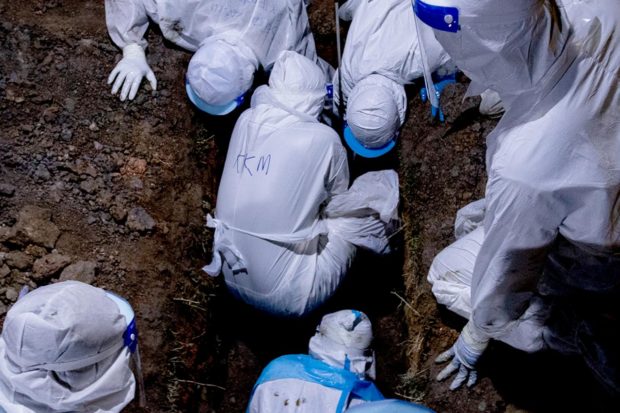‘Photos of bodies stacked at hospitals are real’: Malaysia undertakers struggle as COVID-19 deaths soar
KUALA LUMPUR — Undertaker Muhammad Rafieudin Zainal Rasid now handles as many as 30 Covid-19 funerals a day. Last year, he handled one such funeral a week or possibly one every two weeks.
The number of Covid-19 fatalities in Malaysia began multiplying in April, rising to a record 207 on Monday (July 26) and also Tuesday.
This figure is projected to escalate further in tandem with the surging number of daily infections in Malaysia, which recorded 17,045 cases on Sunday, the highest since the pandemic began.
The health crisis has seen hospitals and Covid-19 assessment centers flooded with patients in recent weeks, and ambulances rushing about the city ferrying Covid-19 patients have become a common sight.
“The authorities told us they expect a rise in the number of deaths over the next three to six months, with 120 a day just in the Klang Valley alone, and 200 to 300 a day nationwide. This is worrying,” Mr Muhammad Rafieudin told The Straits Times.
Health director-general Noor Hisham Abdullah warned on Sunday that the daily caseload is expected to rise to 24,000 in September.
Malaysia had 234 Covid-19 deaths in April, but in May the figure soared to a new high of 1,290 despite the imposition of tighter restrictions under a so-called movement control order.
In June, 2,374 deaths were registered despite the “total lockdown” that began that month. As at Tuesday, 8,408 people in the country had succumbed to the virus.
Scenes like this, where hospital personnel in full protective gear carry the body of a dead Covid-19 patient from the morgue to the hearse, play out dozens of times a day at hospitals.
The government opened a one-stop mortuary centre in Kuala Lumpur last week to deal with the rising number of bodies in the capital. It is equipped with five containers that can hold 225 bodies.

Health workers bury bodies who died due to COVID-19 infection at Raudhatul Sakinah KL-Karak Muslim Cemetery in Kuala Lumpur on 16 June 2021. Photo by Sadiq Asyraf via The Straits Times/Asia News Network
Viral photos of bodies stacked at hospitals and morgues are real, said Mr Muhammad Rafieudin, who is among the undertakers in the Klang Valley working round the clock now.
“Some bodies have to be kept in the morgue for three or four days. Yesterday, we had a case of a Covid-19 patient who died at home and the hospital could not collect the body for more than 12 hours due to a lack of staff or ambulances. The family could not do anything because they were under quarantine. This is what is happening,” he said last Friday.
On top of Covid-19 deaths, suicides have also mounted.
“Since the pandemic, the number of people dying has increased. Some of them committed suicide because of financial problems. We handle an average of one to three deaths every day and more than 20 deaths every month,” undertaker Kelvin Teh told The Straits Times.
“The (number of cases is) getting so high that we’re now facing a shortage of coffins. The crematoriums are fully booked every day,” he added.
Mr Muhammad Rafieudin is so busy these days that he has been able to get only two to three hours of sleep a day.
“The rest of the time, I have to stand by to receive calls, sometimes at 2am, 3am or 4am, guide families through the process, take notes, deploy my teams to retrieve the bodies and carry out the burials. We have 10 teams going out each day,” he said.
He founded the volunteer Malaysian Funeral Management Squad some five years ago to help needy families who cannot afford funeral costs. It handles both Muslim and non-Muslim funerals, including complex cases involving decomposed or HIV-positive bodies.

Prayers being performed for a Covid-19 body. Credit: Yusof Asyraf via The Straits Times/Asia News Network
After Covid-19 hit Malaysia, Mr Muhammad Rafieudin was concerned about the manner in which to bury the dead.
“Before this, I had already learnt how to handle bodies with HIV and Ebola. But the coronavirus is not the same as HIV, which spreads only through needles, sexual contact and blood transfusions. Covid-19 spreads more easily, through air and water, so I started to worry,” he said.
Undertakers must wear a full set of personal protective equipment when handling a Covid-19 fatality, while the bodies are wrapped in two layers of body bags.
Mr Teh, 32, who inherited Hock Thai Casket and Funeral Services from his father, said the coffins in which bodies are placed must be covered in multiple layers of wrapping.
Everything from the personnel and the hearse must also be sanitized multiple times throughout the process and the personal protective equipment worn is burned at the end.
“The journey from the moment we place the coffin in a hearse to after the cremation at a crematorium, workers have to be disinfected. Even the hearse needs to be disinfected,” he said.
For Muslims, the bodies are washed as an essential ritual, but this is not permitted for those who died of Covid-19.
They can undergo only a dry purification process using sand or dust on top of the body bags.
Muslim bodies must also be buried within 24 hours, but with the rising death toll, this is not always possible.
Despite the many safety measures, undertakers remain concerned about being infected.
“Every week we go through Covid-19 tests. Our shop will go through a few rounds of disinfection,” said Mr Teh.
Here, Mr Teh’s team transfers the body of a Covid-19 victim to its final resting place. The coffin is sprayed with disinfectant before it is lowered into the grave.
Mr Muhammad Rafieudin said: “It is a risky job. When I get home at around 10pm each night, I make sure I shower first before I meet my family. Sometimes my children miss me and they want to hug me but I have to be careful.”
He was infected with Covid-19 last month – a harrowing experience.
“I didn’t need oxygen but I couldn’t hold my breath for more than three seconds. Sometimes it felt like I was underwater. It was painful. I thought to myself, so this is what Covid-19 feels like. This is what all the bodies I handled went through. I imagined my own funeral and wondered if it would be carried out the same way as for other Covid-19 bodies, and I shed tears, thinking that I have so much work left unfinished in life. But thank god I survived.”
While undertakers are also at risk of stress and burnout like many people on the front line battling the disease, Mr Muhammad Rafieudin said his job is what keeps him going.
“Even though I don’t get enough sleep, I am happy to help the families. Sometimes they call me in tears saying there are delays of two or three days at the hospital. So I try to speed up the process. They are grateful and I am very happy because I get to help them.
“They could not take care of their loved ones who were sick with Covid-19, and then when their loved ones die, they cannot even carry out the final rites for them. Then there are delays waiting for the burial. So I try to give them peace of mind,” he said.
For the living, he had this advice: “Covid-19 is real. Please stay safe. I know everyone is stressed from being under lockdown for so long, staying at home. But we have no choice. We have to do this while waiting for everyone to be vaccinated.”














